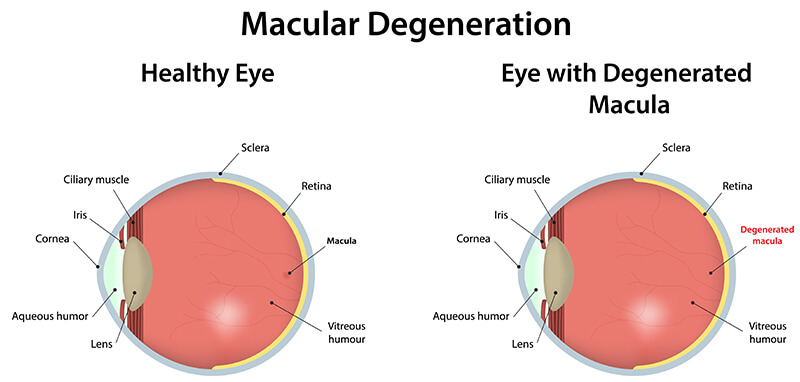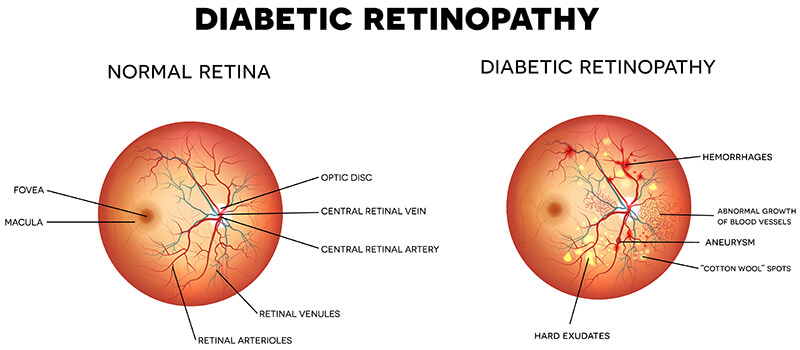Retina Services
What Does the Retina Do?
The retina is the part of the eye that allows the eye to see. The light you see is converted by your retina into signals sent to the brain for you to process the world around you. The retina is the thin layer of cells in the back of the eye responsible for this complex process. Photoreceptor cells in the retina convert light and convert it into signals that the brain can understand. Without a healthy retina, it is impossible to see the world clearly, the way it is meant to be seen.
Common Retina Problems
When the retina is diseased or damaged, it affects the eye in different ways. If you suspect you have a retina condition, contact our office at Desert Vision Center as soon as possible to see our fellowship trained retina specialist. Some retina problems can cause significant permanent loss of vision if left untreated.
Common retina conditions include:
- Macular Degeneration
- Diabetic Retinopathy
Macular Degeneration
The macula is the center most portion of the retina responsible for the fine detail of your visual pathway. A healthy macula controls the detail needed for visual acuity and contrast. When a patient has macular degeneration, the details and contrast in vision are lost.

Macular degeneration (or age-related macular degeneration) is the leading cause of blindness in the United States. There are two forms of macular degeneration, dry and wet. The most common form of macular degeneration is the dry form. In dry macular degeneration, there is a slow breakdown of the light-sensing cells in the macula causing a gradual loss of central vision.
In the wet form of macular degeneration, abnormal blood vessels cause fluid or blood to leak into the macula. This is also known as neovascular or exudative macular degeneration and can cause a dramatic decline in vision. Although rare, about 10% of patients with dry macular degeneration could progress to wet macular degeneration.
Diagnosing Macular Degeneration
Besides a comprehensive dilated eye exam, diagnostic tests are important to distinguish between the dry and wet forms of macular degeneration. Additionally, testing is needed to monitor disease progression and evaluate the therapeutic response. High definition optical coherence tomography (OCT) and retinal fluorescein angiography are commonly used tests for the precise imaging of the macula to help guide treatment of macular degeneration.
Non-Surgical Treatment Options for Macular Degeneration
When it comes to macular degeneration, there are several non-surgical treatment options. Not every treatment option will work for every patient.
Diet and Supplements
For early dry macular degeneration, nutritional therapy is the starting point for therapy. The Age-Related Eye Disease Study (AREDS2) found a reduced progression of macular degeneration in patients taking a specific combination of vitamins and nutrients (AREDS2 Vitamins).
Injections
For patients with wet macular degeneration, injections are used to prevent further loss of vision. Anti-angiogenic medicine is injected into the eye to help stop new abnormal blood vessels from forming. With early diagnosis, intravitreal injection treatment can prevent further loss of vision.
Surgical Treatment Options for Macular Degeneration
The implantable miniature telescope is a new surgical treatment option which involves using a tiny telescope that is implanted inside the eye to improve vision and quality of life for patients with end-stage macular degeneration. The implanted telescope is done at the same time as cataract surgery. Unlike cataract surgery, there is a rehabilitation process that involves a team of CentraSight eye care professionals to help you along the way. To see if you are a candidate for the implantable miniature telescope, schedule a consultation at Desert Vision Center by calling 760-340-4700. For more information call 1-877-99-SIGHT or visit www.centrasight.com.
Diabetic Retinopathy
Elevated blood glucose levels in both type 1 and type 2 diabetes damage the blood vessels in the retina leading to diabetic retinopathy. Eventually, macular tissue swelling, internal bleeding, and interruption of retinal blood flow can occur with profound effects on visual function. Any patient with diabetes should be routinely checked with a complete dilated retina examination and treated before any visual damage occurs.

Symptoms include:
- eye pain
- double vision
- cataracts
- fluctuating vision or prescription changes
- image distortion
- spots in vision
In diabetes, high blood sugar can damage the blood vessels in the retina. Early detection of retina damage in diabetic retinopathy is critical is protecting and preserving your vision. In cases where diabetic retinopathy threatens vision, non-surgical treatment options include intravitreal injections and retina laser. If you are at risk for diabetic retinopathy, schedule a consultation at Desert Vision Center by calling 760-340-4700.

